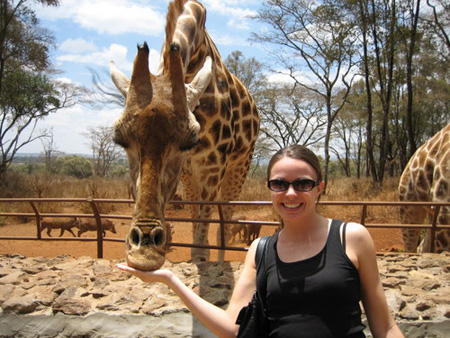Expat UK: An Interview with A Lady in London
Summary: An expat interview with Julie Falconer, a travel writer and author of the blog - A Lady in London.
 All over the world, people wake up each day and dream of jetting off to live an exciting new life in a far away place. Some do, but so many others, for a variety of reasons, never follow their dreams to distant lands.
All over the world, people wake up each day and dream of jetting off to live an exciting new life in a far away place. Some do, but so many others, for a variety of reasons, never follow their dreams to distant lands.
This reality is reminiscent of a poignant moment in Wes Anderson's visual masterpiece Moonrise Kingdom, in which the two lead characters, Sam and Suzy, confide in one another that they "want to go on adventures" and "not get stuck in one place" when they grow up. And even though the movie ends on a high note, we're left wondering whether they will ever pursue the adventures they imagined.
Make no mistake about it: Julie Falconer chose adventures, she pursued them, and you won't find her stuck in one place for very long.
After she completed her undergraduate degree in international relations at Brown University - which included summer internships in Paris and Brussels and semesters in Nice and Prague - Falconer launched a career in finance. The long hours at a desk soon wore on her, and she soon found herself "itching to get back to Europe."
The native Californian, who resides in London and travels the world as a travel writer for some of the most popular travel publications in the world, opened up the world to herself with her successful blog, A Lady in London.
But how does a California girl end up in London? Going from "I want to move back to Europe" to traveling the world as a freelance travel writer is a long walk, isn't it? Let's learn a little bit more about "A Lady in London," find out exactly how she did it, and what advice she has to offer others.
What was life like for you growing up? How did these experiences contribute to your desire to live abroad?
My family traveled a bit when I was growing up, but mostly in the US. My grandmother was from Scotland, so we went to visit relatives there a few times. My mother had spent time traveling abroad when she was in her 20's, and I always loved her stories. When I was 18, I went to a language school in Nice, France for three months, and that was when I started to travel on my own and see how great expat life could be.
What are the personality traits you possess that make being an expat a good fit for you?
The most important one is flexibility. Things are never going to be the same in a new country as they are back home, and the more I can accept that with a positive attitude, the easier the transition is. Another is being willing to meet new people and learn about other cultures. As an expat, I meet people from all over the world, which is exciting and eye-opening.

How would you contrast your life in the financial sector with your expat adventures? Are they in any way similar?
They are vastly different. I used to sit at a desk for over 12 hours a day with little change in my routine, and now every day is an adventure. Being a travel writer takes me all over the world, and running my own business means that I do a wide variety of things that keep my work ever changing. The only similarity is that I still use spreadsheets to manage a lot of logistical elements of my business.
What are your favorite aspects of life in London as an expat?
London is a huge city, and there is always somewhere new to explore here. World-class art, music, and culture come through London, and the city has great diversity and rich history. As a travel writer, I also appreciate that it is easy to get almost anywhere in the world from here.
What are your least favorite aspects of life in London as an expat?
The chronic public transport delays are a challenge, so I try to walk as much as I can to avoid them. It also takes a long time to get set up here in terms of housing, utilities, bank accounts, phone contracts, and other basic expat necessities.
How did you find your way into travel writing?
When I moved to London, I started writing my blog, A Lady in London. I had always loved to write, and I wanted both a creative outlet and a way to keep in touch with people back home while I was overseas. After a couple of years, the blog had a big enough audience that I started running it full-time as a business. Now I write for the blog as well as publications like Lonely Planet and National Geographic Intelligent Travel.
How is writing your blog different than writing for a mass-market publication? Do you have a preference?
Writing my blog is more personal than writing for a mass-market publication. I prefer to write for my blog, as I can add more of my personality into my writing.
What do you miss about London when you are bouncing around the globe?
I miss my friends here, but most of them travel a lot, too!
What do you miss about California?
I miss my family and friends the most. I also miss the food and wine, which are some of the best in the world. The California coast is a beautiful place, and I took that for granted growing up. Now I appreciate it all the more when I visit.
What do you find enjoyable about having your own blog?
I love being able to share my experiences with people all over the world. It is great to capture moments, tell stories, and inspire others to travel. Above all, I love that the blog has a loyal community of readers from all over that can share their experiences and advice with me as well.
How did you go about launching your blog? Did you receive any formal training in blogging or in web development?
I don't think formal training in blogging existed back then! I had a blog that I started back in 2002, so I already knew how to run one when I launched A Lady in London in 2007. I used a template for the back end of my current blog, and focused on the writing and photography initially. Later I taught myself HTML, PHP, and CSS so that I could customize the look and feel. I have a friend that helps me out when things go over my head, but for the most part I can manage it.
How much do you enjoy the technical aspects of your blog, such as PHP and CSS?
I enjoy PHP and CSS in that they allow me have a lot more control over my blog than I otherwise would (and they allow me to make changes much more quickly).
What was the funniest experience either traveling or as an expatriate?
I have funny experiences all the time as an expat in London. Despite the fact that Americans and Brits both speak English, we have two very different versions of the language. Over the years, I have found myself in all kinds of funny situations when I use a word that means something vastly different in British English than American English. I once spent ages in a grocery store asking people if they knew where I could find toothpicks. Finally someone told me that they are called cocktail sticks in the UK. It didn't take long to find them after that!
What was the most nerve-wracking experience either traveling or as an expatriate?
Whenever I have to renew my visa in the UK, I spend weeks worrying that I will make a mistake and my application will be rejected. Then once I've turned it in, I spend more time worrying that something will go wrong and I will be sent packing. I just applied for British citizenship, so I am in one of those phases now.

You've been to some exotic locations... what do you do to ensure your safety in places like Africa, etc.? What advice would you give to others?
Safety is the same everywhere: I'm careful to be aware of my surroundings, and if I find myself in a situation that doesn't feel right, I get out. It doesn't matter whether I'm in Africa or London.
In addition to travel writing and blogging, you also provide social media and travel planning services. Can you share how you manage all of these at once, and how overwhelming do all of these responsibilities get?
It can be overwhelming to do so many different things at once, but I really enjoy the diversity. I have learned to prioritize things in order of time and deadlines, and I stay very organized. I work 7 days a week, 365 days a year, so that helps, too! I really enjoy planning trips for clients, helping businesses with their social media, digital strategy, and blogger outreach, and teaching classes and webinars, all in addition to the writing and photography I do. It certainly keeps things interesting!
Do friends or relatives ever join you in your adventures?
Yes, I often travel with friends and relatives, which is a lot of fun. I enjoy going on trips with others, and traveling always results in stories and memories that can be shared and re-shared for years.
What advice would you offer to an expat moving to London? What are common mistakes that expats make?
The cost of living in London is generally higher than in most places. Rent is more expensive, and things like eating out are more costly, too. Make sure you take that into account when you move so that you don't find yourself broke shortly after you arrive! Additionally, stay flexible and be patient if it takes a long time to set things up when you first move here.
One of the common mistakes that American expats make when they move to London is in thinking that British culture is the same as American culture (the same goes for language). Be prepared to discover that they are very different in many ways.
Expat life may not be for everyone... what are some personality traits that might be a red flag for someone considering moving abroad?
There's no personality trait that makes someone unfit to be an expat. So long as a person can be flexible and open to new experiences, that person will be fine abroad.
A lot of people want to know how to manage all of the red tape and just get permission to live and work in London, and the Eurozone in general. What advice would you give them?
The rules have changed dramatically since I moved to the UK, and the country has cracked down on immigration to the point that the visa I came in on no longer exists. It is much more difficult to move here than it used to be, but there are still opportunities, particularly if you are sponsored by an employer.
In your experience, if someone isn't sponsored by an employer, what are his or her options? Have you known people that came for a short stay and found a way to make it work. If so, how?
There aren't many options besides sponsorship, several types of entrepreneur and investor visas, and student visas. There are 6-month tourist visas for Americans, but you can't work while you are in the UK. Unfortunately most options have been closed off over the past five years as part of a larger effort to stem immigration.
Here are a few expat specific posts from "A Lady in London":
A Lady's Expat Holiday Blunders: "How could I possibly screw up Mother's Day, you ask? I wondered the same thing. It's not like my mother is British or anything. Surely as an expat I could get Mother's Day right. Right?"
Lady for Six Years: "Six years is a big anniversary for American expats in London, as it is the point at which many of us are eligible for British citizenship."
Lady and the UK Election: "I, as an immigrant, am not permitted to [vote]. But that didn't stop me from begging all of my friends that could vote to choose whichever party would not revoke my visa and eject me and my fellow migrant laborers from their lovely country."
About the Author
 Joshua Wood, LPC joined Expat Exchange in 2000 and serves as one of its Co-Presidents. He is also one of the Founders of Digital Nomad Exchange. Prior to Expat Exchange, Joshua worked for NBC Cable (MSNBC and CNBC
Primetime). Joshua has a BA from Syracuse and a Master's in Clinical and Counseling Psychology from Fairleigh Dickinson University. Mr. Wood is also a licensed counselor and psychotherapist.
Joshua Wood, LPC joined Expat Exchange in 2000 and serves as one of its Co-Presidents. He is also one of the Founders of Digital Nomad Exchange. Prior to Expat Exchange, Joshua worked for NBC Cable (MSNBC and CNBC
Primetime). Joshua has a BA from Syracuse and a Master's in Clinical and Counseling Psychology from Fairleigh Dickinson University. Mr. Wood is also a licensed counselor and psychotherapist.
Some of Joshua's articles include Pros and Cons of Living in Portugal, 10 Best Places to Live in Ireland and Pros and Cons of Living in Uruguay. Connect with Joshua on LinkedIn.
Additional Information:
- UK Guide
- Healthcare & Health Insurance in UK
- Members Talk about Healthcare & Health Insurance in UK
- Best Places to Live in UK
- Real Estate in UK
- Guide to Real Estate in UK
- Pros & Cons of Living in UK
- Cost of Living in UK
- How to Buy a Home in England
- Pros and Cons of Living in England
- How to Rent a Home in England
- How to Enroll in the Public Healthcare System in England
- 2025 Guide to Living in UK
- Pros and Cons of Living in UK 2025



